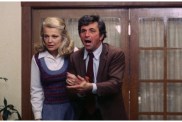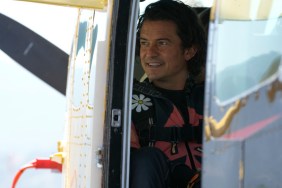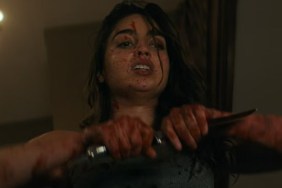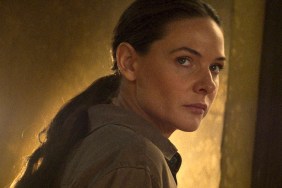There are lots of fun, light and entertaining movies made every year, but Damian Harris’ Gardens of the Night is probably none of these. What it is, is an important movie, one that deals with the difficult subject matter of child predators and their connection to teen prostitution in a way that’s honest, frank and real.
Modern moviegoers might not be too familiar with Harristhe son of the late great Richard Harrisbut that’s because it’s been eight years since his last movie, the thriller Mercy starring Ellen Barkin. His new movie Gardens of the Night is a project he first started writing and researching nearly 20 years ago, but which failed to get off the ground even with Leonardo DiCaprio in a starring role. A few years ago, Harris decided to revisit the material, realizing that many of the issues the movie explores were still relevant.
The film tells the story of Leslie (Ryan Simpkins), an innocent 8-year-old girl abducted by two men, played by Tom Arnold and Kevin Zeggers (Transamerica) and inducted into a child pornography ring, who ten years later (played then by Gillian Jacobs) is living on the street with her friend Donnie (Evan Ross) who went through the ordeal with her, and they’re trying to make ends meets by offering sex for money until she arrives at an epiphany.
With key roles played by John Malkovich, Harold Perrineau (“Lost”) and Jeremy Sisto (“Six Feet Under”), Harris’ film already won a prestigious critics prize at the Deauville Film Festival in September, but ComingSoon.net had a chance to sit down with Harris more recently to talk about his long-gestating film.
CS: I was reading that you started this film almost 20 years ago, which is amazing since I talk to so many filmmakers about how long it takes to get their dream projects made and I hear four, five, even ten years, but nothing quite this long. Did you just happen to find your earlier script after a long time and what was the impulse to reexamine it and try and get it made?
Damian Harris: I kept coming back to that story and about this tale. I go off and make a film and then after I think, “Well, what do I want to do next?” and I kept thinking that I’ve written this thing and it really was something that I had such a strong connection to that I thought I’m making into movies other films, so that I can get to make this film because it was so hard to get financing for it. I kept thinking that as I got more successful it would enable me to get to make this movie. I recognized that it was a subject that I couldn’t get a studio with or expect to make for a lot of money. I actually also thought the script kept getting refined and it kept getting better and better and I kept getting better as a film director, so getting more able and ready to make it. I would just read it again and I’d very strongly identify with what the film was about and the idea of making it from the point of view of Leslie; it was a strong connection for me.
CS: Did anything change in the environment or in independent filmmaking that made it easier to get financing now? Or was it a matter of you having made movies and having a bigger body of work to show possible financiers?
Harris: No, I think it did get easier. I think the first time we had this up and running, I was working with a producer called Nick Wecksler, who was my manager and also Leonardo DiCaprio’s manager, so he was going to play Donnie. He’d just come out of a TV show then, he was 17, and the budget was four million dollars and then we ended up making the film for substantially less 17 years later. I think just the price of filmmaking went down dramatically. I mean, you could make films for cheaper than you could. I think at that level, more people wanted to get into the film business and wanted to get into making movies, so there was a bigger pool to choose from who were willing to work for less. Probably originally, it would have been more of a professional and studio environment whereas it was really more low budget.
CS: I noticed that you set the movie in the ’80s still, so what was that important?
Harris: It didn’t start in the ’80s. No, it starts in the nineties, and then it goes forward eight years so that it gets brought up to the present, but it didn’t maybe look like that… When she’s eight years old it’s like 1997 or something.
CS: I was curious about that because we see them watching the moon launch, so I assumed that was a flashback to the late ’60s.
Harris: I think that’s because that was the footage we found we could put on the TV.
CS: I know you did a lot of research back in the eighties, so I was curious whether it had changed and you had to go back and do different research to make the movie now.
Harris: I did go back and sadly not much has changed. San Diego has changed a bit, but only because they have become more gentrified and so the kind of street population had been sort of pushed to the outskirts of the city as opposed to being right in the middle of it.

CS: They’re still there, as I’ve seen when I’ve been there in recent years.
Harris: I mean that was the thing that had changed. Where it was happening had been sort of relocated, but the statistics haven’t. I think that maybe in the ’80s it was a bit more hysterical the reaction to it, you know, this notion of what was going on, so the statistics were a little more terrifying. They really know what they’re talking about now, so I think you can say with certainty, this is the numbers that we’re talking about, this is what is going on. I think I want it to be a balance for this. The idea is not to terrify every parent; the idea is not to instill fear in every child this is going on. It is and there’s got to be some awareness of it, but you can’t stop it. What’s important is what happens afterwards, too, because that’s what the film is about. When it happens to a child, who does that child grow up to be, and how do they deal with it? Then the person that has a relationship with that child or with that young adult, once the adult is grown up, has to know that that experience shapes them and the only way to do it is to talk about it because I think Anjelica Huston said when she made a movie called “Bastard Out of Carolina,” there’s a quote she said I only heard two weeks ago at a film festival in France, it was to dealing with abused children and they said that, “It’s a disease that withers in the daylight.” I think that’s really true. If you could bring it out and talk about it. First there’s a kinship with other people who’ve gone through it. I’m always constantly surprised about how people can say, “Well, actually that happened to me too.”
CS: I asked about when the movie was set, because these days, parents are far more naturally afraid. At least in America, you can’t just have your kids go out by themselves. It’s different, you know?
Harris: You know, you can go too far in that way as well as being sort of living in terror of there being a boogeyman out there. And there are, there are people out there, but there are also people right next door to you unfortunately and it’s just being vigilant. The idea is not to try to have children live and grow with this fear.
CS: I was curious about casting the young kids. I was surprised by how many things Ryan had already done, but being that this was a difficult subject, how did you handle that with the younger kids who had to be involved in this kind of a thing?
Harris: With Monique who is Ryan’s mother, we came up with an alternate script, and in our script, Tom and Frank Tom Arnold and Kevin Zegers we told them that they take the children because they wanted a family because there was no Mrs. Arnold. So he wanted to have a little boy and a little girl, and Kevin wanted a brother and sister, so that’s why they take them. The idea was to be this kind of fake family. Then each scene, like for example the scene where she’s taken to the motel where there’s the man with the red light bulb, we said that Kevin has to go to a job every day and Tom has to take Donnie to the doctors, and Donnie’s upset, so Tom Arnold doesn’t want to leave Leslie at home alone, so he says he’s got a friend. He drops her off to stay with this friend in this motel, and the friend has been drinking and he gets a bit upset with Leslie so he locks her in the bathroom so he can watch TV, then the guy falls asleep, and when he wakes up, he forgets about Leslie in the bathroom and so he goes out to have lunch. When Tom comes to pick her up, she’s been left in the bathroom for four hours, so she’s really upset and crying, and I said, “You’re lying on the bed and really upset and crying because he’s been left you in the bathroom” and he’s saying, “Oh, its okay. Don’t worry.”
CS: I see, so you give them different scenarios to work from.
Harris: Yeah, that’s what she thinks, and the only one that we didn’t have to fake was the one with Harold Perrineau. Because that was a fake scene anyway, we said to her, “Look, Tom wants to be like a hero to you as your dad, so he’s asked his friends to be like this bad guy who’s gonna upset you and hurt you, and then he’s gonna run in and sort of save you. So that he can be like the hero. So you’re thinking he’s like a heroic dad. It’s kinda pathetic.” So she completely got that.
CS: I was wondering how you got her to do that because it seemed like a really tough scene.
Harris: She thought it was funny. Children, at least good ones, their emotions are really close to the surface, so you just have to tap into it. We had a really good acting coach and her mother, and we just literally had to find a story in their own life because they don’t act she was never acting Leslie, she was being Ryan. So you’d just go, “Okay, you’re at the airport, you got separated from your mother, your plane’s taking off, you can’t find her. You know she’s going to be upset, and you’re waiting, and just thinking about that. Maybe your mom got on the plane without you.” And she’s, “Oh, okay, all right.”
CS: So she always knew that this was just play acting.
Harris: Yeah, or also something directly referring to her own life.

CS: How about getting Harold (Perrineau) or Tom (Arnold) involved because they had to play the bad guys? Did they understand why they had to do this and why it as important?
Harris: I think Tom definitely he had his own reasons why he wanted to do it. Initially, he was kind of resistant to it, but I think the project spoke to something that was important to him. Harold came to a read-through and he was again also reluctant, but I think he saw the quality of the other actors that we had and he met Ryan and he felt he could do the scene with her, so he felt comfortable about it and he signed on.
CS: Harold is an amazing actor. He just did a movie called “Felon” where he played a prison warden and you wouldn’t recognize him, and I saw Gillian in “Choke” recently and I would not have known she was the same actress.
Harris: She’s excellent in it.
CS: How did you find her and what was it about her that made her right to play the older Leslie?
Harris: We had a typical indie film dilemma which was that the girl who was cast to be in our film had also been double-booked by CAA (her agents) to a much bigger film. They thought that we would push our dates, but they didn’t tell us until two weeks before we were about to start filming, so we didn’t push our dates. We had lost the other actress, and so we began looking around, and Gillian had not been available to come in for casting originally because she was doing a play in New York, so she was in Los Angeles and it was one of those happy coincidences. She came into the reading rooms, we hadn’t seen her before, and she discussed the character. Because she was trained at Juilliard, she discussed it from a point of view that was to me really interesting, and she had this thing… I mean, she is very fortunate, she looks younger than she is so you believe her as a kid in her late teens, and yet she had the ability to get the emotional depth that the character needed to go through at the end of her film which is not the case with some of the 16-year-old actors that we saw. As a matter of fact, even real kids we looked at as well, they could play the surface of it very well, but when it gets to the last part of the film, you just have to know what that is and that issue is something that is so profoundly damaged inside of her with the shame she feels to what she’s done, the responsibility which to me is the core of the whole movie because that’s what ends up happening. You go through this kind of a trauma as a child and why it’s so evil is that the adult usually makes you feel you are complicit in what’s going on and that somehow you’re responsible for this as well, so you grow up thinking that, “I had something to do with it.” For me, it was really important at the end of the movie that you see that. That you see that everything about her is dissociated from herself. Yes, she’s somebody who’s hardened and kind of closed down except that is the core problem inside of her–that this was the little child–and I wanted that to come through. She got in and just nailed it.
CS: Had you shot any of the stuff with Ryan earlier that Evan and Gillian could kind of watch to know what happened to them as children?
Harris: No, but Evan and Gillian were on the set every day, so she was watching and she actually had a relationship with Ryan and she watched every scene that was shot. We shot it in sequence. So we did the first half, we did the eight-year-old first, and then we went to the 17-year-old. So she really could watch.
CS: There are interesting themes in the movie about the cycle of abuse. You probably can assume that Tom Arnold’s character may have been abused in the past, which he turns around and does to these kids as an adult. Do you feel that might be seen as a defense for his behavior?
Harris: No, I don’t, and in my research that I did, there’s a suspicion cast on pedophiles, who claim that it’s all recitative, or they are the result of (pedophelia), but then there’s also the way of looking on it saying once you’ve been arrested in court, the easiest thing is to say, “It happened to me as well” as a form of excuse. Yeah, there’s a certain doubt actually cast on the truth about how many people, you know when they say, “Yes, this has happened to me” about how truthful that is. In Tom’s case, personally I just thought that you just have to know that he was driven by having a relationship with an eight-year-old girl. He and I talked about it and I was like, “I think there’s something emotionally stunted in that guy that he could really only respond to a child.”
CS: But that’s not an excuse.
Harris: No, that’s not an excuse, it’s just looking at the psychology of it. Perhaps there was something stunted about his emotional growth. That’s what he responded to and sexualized. Whereas, the Kevin Zegers character was adopted by Tom and had been through this cycle with him, but then Tom had not gotten rid of Kevin, and now he’s too old. They became this uncomfortable alliance in a sense, and that’s why I think that Kevin is angry when these kids come in because he sees himself being replaced.

CS: I was trying to figure out the motivation for Kevin Zegers’ character, because it wasn’t clear whether he was just kidnapping kids for the money or what?
Harris: No, it’s all driven by a sexual impulse, and then the money is a side benefit I’d almost call it. For me, I wanted it to be vague because I felt that from the child’s point of view, your abuser usually is a vague person. There’s a vague characterization of who they are. There’s somebody that is both your provider and also your predator, so you have this very confusing identity of who this sort of adult is, especially then when you start to look back on them from the years going by, they become this sort of vague figure of just having a huge force, an influence on you, but who actually were they? That’s what I wanted it to seem like, that you never quite know, because I don’t feel like children don’t ever quite know what’s going on.
CS: How do you think that people can break out of the cycle of abuse we see in this movie?
Harris: What I’ve seen, first of all it’s externalizing it. It’s talking about it.
CS: Which is the hardest thing possible for someone who has been abused.
Harris: I think it’s the first big and major step. Recognizing that what happened to you that the person who did it is completely responsible, they are the ones who should be blamed, and they’ve done something that’s evil. No matter how banal they may come across to you, and then being able to find a kinship with somebody who has been through something similar and to talk about it. Hopefully you realize that it’s not that unique and that you’ve been the victim of it, not the co-conspirator. I think that’s the dialogue that comes up from it.
CS: Is that one of the main things you’d like people to get out of this movie?
Harris: Yeah, I do, yeah.
CS: Have you played this movie for anyone who’s actually gone through this kind of experience?
Harris: We just came back from a screening of the film in Geneva and in Paris specifically for a foundation called “Innocence in Danger” which is set up for victims of child abuse. The majority of the audience were either people that had dealt in this or had been through it. So they’d either been dealing in that in helping people or they’d actually been through it themselves. I could see it was a film that was really provocative and that was one of the most gratifying responses I’ve had. Afterwards, to have, like I said the kinship with people that have watched it and to just get a hug. People said, “Thank you for having made it.”
CS: Where do you go from here? There must be a huge weight off your shoulders to finally have finished this and getting it out there. I know you probably have some other scripts you’ve been working on over the years.
Harris: Yeah, I’m gonna do something very different basically, but it’s been hard because this really has been sort of my life for the last couple of years full-on without any sort of break or any other considerations. When it’s released it will be strange to not have this be so much a part of my life.
CS: Do you have a specific script you want to work on next or is it a matter of which one gets financed first?
Harris: I’ve got something I want to do in England which is called “Pop,” it’s sort of a grandfather-granddaughter story that I want to tell. I’m hoping to do that next year with Patrick Stewart at the end of next summer.
CS: Are you trying to do more independent projects at this point or are you trying to shop scripts around to studios to finance?
Harris: This was not a studio film nor is the one in England a studio film. If I come up with some idea that I know fits that mode, then I’d go there again.
CS: I was curious as a writer whether or not you think while you’re writing something, “Okay, this is going to be one I do for myself, and the next I’m going to do to pay the rent.”
Harris: Well, you get more aware now especially as it’s become more clear what studios make and what they don’t make. As you sit down to write something, you have an idea about where it’s going to be set up, and then therefore that caters how you write it because you know you’re going to have a type amount of money to raise and to get do it. You should reflect that in how you deal with the subject and how you write it or you do choose something that you think “This is something that could have more of a mass appeal,” and let yourself go with it.
CS: Is it hard not to get cynical about that sort of stuff while writing?
Harris: It’s not cynical; it’s about being more experienced, and I think it’s also a change, I think there was a time you could write dramas and you could go to a studio and think they’d make it and now, it’s very hard unless you have a huge star willing to be in it. Otherwise, it’s being dropped down to the independents or cable. It’s harder to do, especially in this country. In Europe, (drama) is taken as being the staple of being mainstream cinema, it’s not over here; it’s more genre films or sort of more bigger budget.
CS: Or talking dogs.
Harris: Yeah, that’s what it’s about, isn’t it?
Gardens of the Night opens in select cities on Friday, November 7.









